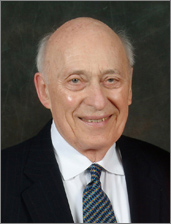Lester Breslow
Year: May 18th, 2006
Location: Minneapolis, Minnesota
Interviewed by: Blackburn, Henry
Abstract
At age 91 Les Breslow is writing, lecturing, and consulting at the higher levels of public health thought and policy. In this visit to Minnesota to acknowledge his family scholarship for outstanding students in epidemiology and health promotion we had a chat on his life and times.
The interview ranges over his Midwestern origins, progressive politics, and remarkable career in public health and academia, in research, teaching and administration. The definitive story is recounted of his population laboratory, the Alameda County Study, set up while he headed the California Department of Health, and how it was saved by Harold Dorn, statistician of the National Cancer Institute after a negative NIH site visit.
We get a fine picture of his long interest in health behavior, originally planning to make a career in psychiatry, which then matured into concern with the conditions under which health is fostered or not, or social ecology. We discuss the causes of the lag between knowledge and public health applications, with its origins in dissemination, professional and commercial resistance.
His thinking and writing these days treats the idea of a third epidemiologic transition, a third revolution in public health going beyond infectious and chronic disease prevention to preserving health and the quality of life, both as a challenge and a right, in developed and developing worlds. (Henry Blackburn)
Quotes
LB: That was very interesting because we wanted to measure, we did measure, actually published this, physical, mental and social health. And my concept of social well-being was different from that of what WHO had intended or anybody else believed. My concept was social well-being of an individual is not just the community well-being where he lives; that, of course, influences health profoundly, but his personal, individual social well-being, which is in his connection to the society. In other words, how many friends and relatives do you talk to in a week? Do you belong to a church or any other organization, club? Etc.
LB: I went to visit Meyer Friedman in San Francisco to ask him about Type A Behavior some time in the 1970s. After a cordial beginning in which he embraced me as a fellow Type A, he began to get more and more testy with each innocent question about his Type A interview method, reliability, and such. Our visit deteriorated until suddenly, in a fit of pique, he got up, walked away, then turned to me irate and shouted: “You’re g–d—– near a Type B!” (the ultimate insult) and stalked off. End of interview.
Full Transcript Access
Full transcripts of interviews may be made available to those engaged with original materials for scholarly studies by contacting us.
